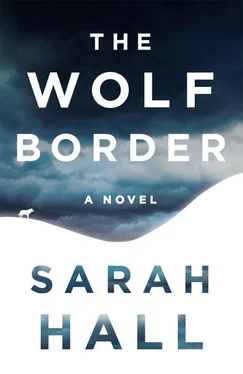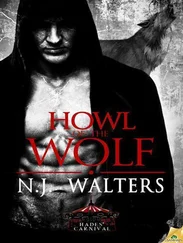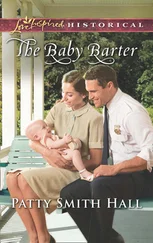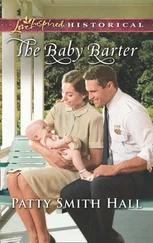The gate opens to allow her exit and closes slowly behind her, and though it’s her choice, she feels expelled. She picks up the western road, which is narrow, unwalled, and crosses the high moors. There are few properties on the way; no working farms remain, and the stretch is not popular for second homes. On the near horizon is Hinsey Knot. She decides to stop and take a walk. In a stony layby, she changes into jeans and boots, zips up her jacket. The grass underfoot is springy and dun coloured, the path wending up the fell made of shattered rock. She ascends, without haste but swiftly — it is not a taxing climb. She puts up her hood against a sudden squall, her thighs dampening. She passes no one. The mountain is more of a grassy mound, the path barely steepening past thirty degrees. The sun emerges, still with warmth in it. Two buzzards turn loops on the currents of air above. A rabbit darts across the slope and is granted amnesty. When she reaches the cairn she sits and looks at the view, land graduating towards the unspectacular brown sea, belts of cloud moving in from Ireland and strobing light on the ground between. A stiff breeze tugs at her sleeves and rattles her hood. She calls Kyle. It’s still early in Idaho, but he answers.
Christ. You sound like you’re in a wind tunnel.
Sorry. Hang on.
She turns her head, then moves into the sheltered lee behind the cairn.
Better.
They catch up, briefly. There is no news of Left Paw. There have been no sightings, alone, or with the pack, and none of the coordinated aircraft have picked up the signal. The radio collar appears to be dead. She cannot help but be suspicious.
I just don’t like coincidences, she says.
Shit happens. Nothing we can do. This is expensive, go back to your mom and spend some time with her.
Yeah. Is it still snowing?
Yep.
Everything else OK?
We’re good.
Alright, then.
She hangs up, pockets her phone and begins down the slope towards the hire car.
On the way back to Willowbrook she stops off at a pub — The Belted Will, a stacked-slate building with empty hanging baskets outside the front door. She orders supper. She will miss dinner at the home, but she can’t quite face the experience again. The bar is pleasant enough. At the counter a few locals sit on stools; there are one or two passing travellers — late-season walkers, perhaps. A vinegary smell piques the air, combined with hops and cleaning fluid. A coal fire glows orange at one end of the room; she sits at a table nearby. While she waits for the food she takes a stack of printed papers from her bag and reads through — the chapter of a book she is working on. It’s slow-going — too slow; it seems like she is always rewriting as more study results come in. The pub conversation is sporadic, mostly between the landlady and the punters, occasional laughter from the end of the counter, where a young man is standing, watching Rachel on and off. The village in which the pub is located is relatively large, but for Friday evening the venue is too quiet; it will not last long if this is the extent of its patronage, will go the way of so many unfrequented Lakeland ale houses.
She looks up. The young man is staring at her again. He raises his pint glass and smiles, drinks the remaining beer, leaves a spit of white foam webbed in the bottom of the glass. He is fit under his shirt and jacket, bullish, very blue-eyed. He is wearing a wedding ring. A wife at home then, watching television, drinking wine with her girlfriends, or minding a baby, perhaps. A wife who knows nothing, or maybe chooses not to care. The rules are always the same.
In America it’s easier: the codes, the expectations, what is and is not on offer. Oran is the easiest choice, and always available, but the hope and petulance afterwards are tiresome. She sees him most days in the office, must navigate tensions. He’s too close, too keen. Sometimes she goes to the casino. The gambling is uninteresting, and she doesn’t bother with it. But there are new faces, and a lone single woman such as her, not wearing a low-cut dress or heavy make-up, is no cause for concern, is not touting for business. The casino bar is busy. She steps through bodies to the counter and orders a drink, scans the room, as if searching for a friend who is late. Something about the cut of one of them — it is hard to know what exactly, the way he carries himself, his movement, or strength of bones — appeals. The way he acts can be interpreted: confidence, frustration, availability, a man on the border of a relationship, leaving or entering it, feeling entitled either way. She’ll lean past to take a serviette from the dispenser, between him and his friend. Sorry, hun — excuse me. That’s OK . A conversation starts up, designed to facilitate, nothing more. Her occupation is controversial, divisive — she avoids talking about it. Every man has an opinion. Often she will lie, limit the truth — I work on the Reservation; I’m in conservation .
The hunters are easily identified — close-shaven, militaristic, or long-haired and greasy, white marks from the sunglasses along their temples. Western liberals are preferable, the polo players, the pseudo-ranchers; their shirts neater, leather money-belts, a new truck. If her job is ever revealed, they are surprised. She is not a woman of hemp trousers and dry braids, neuter, husbandless, not an eco-freak. A woman like her someone will be fucking, or want to fuck. Her eyes are between colours — towards green, and in the daylight unquestionably green.
The rest is easy; everything plays out. Can I freshen that drink for you? Thanks, but I was just leaving. Hey, you’re Scottish? He is tall, looking down, his hand resting along the counter where she stands, almost mantling her. His friend is ignored, so turns away. No, just the other side of the border. Well, I’ve been to Edinboro — let’s have a scotch for Scotland , he suggests. OK . Three drinks is her limit. There will be a discreet place to test it — outside the restrooms, or in the parking lot. Proclivities can be detected, risks. A few will pull back, suddenly ashamed or guilty, but not many. The drives are sometimes long to get to an apartment, or the house of a compliant friend. She does not take them to her cabin. There are cheap motels on the way out of town. She’s crossed the Lolo Pass before, has gone into Washington State. She drives her own truck. He follows behind.
Or, more recklessly, she pulls off the road, down a dirt forestry lane, past seized-up logging equipment and stacked lumber. He parks behind her, gets out of the car, walks up slowly. Wrong turn? Got a flat? The darkness is not deep with the wattage of so many stars. She opens the truck door, steps out, leaves it standing open. In the cab light copper moths flicker; there are fireflies pulsing in the grass between pale trunks. Pretty night . She says nothing. She can’t really see his face. He keeps talking, makes another joke. Then he figures it out. He steps in, kisses her, one of evolution’s stranger necessities. It does not take much to accelerate him, the angle of her body, her tongue. He backs her against the truck, trying to judge the levels of permission: is this an interlude or the main event — his thoughts almost audible. He runs a hand over her shirt, over her breasts. She puts hers to his groin, the bulking jeans. Now he believes. Then it is like gentle fighting, both with each other and the impediment of clothing. They climb into the flatbed of the truck, and her shirt is taken off. She has a scar on her back, kidney to fifth thoracic, the line is buckled, stitched by a regional surgeon. A good story, but she doesn’t often tell it. She is swollen with blood; he slips his fingers in. The flash of a wagon’s headlights on the other side of the trees; a low rumble on the asphalt. Transporters, for whom the night is ephedrine and bluegrass.
Читать дальше












